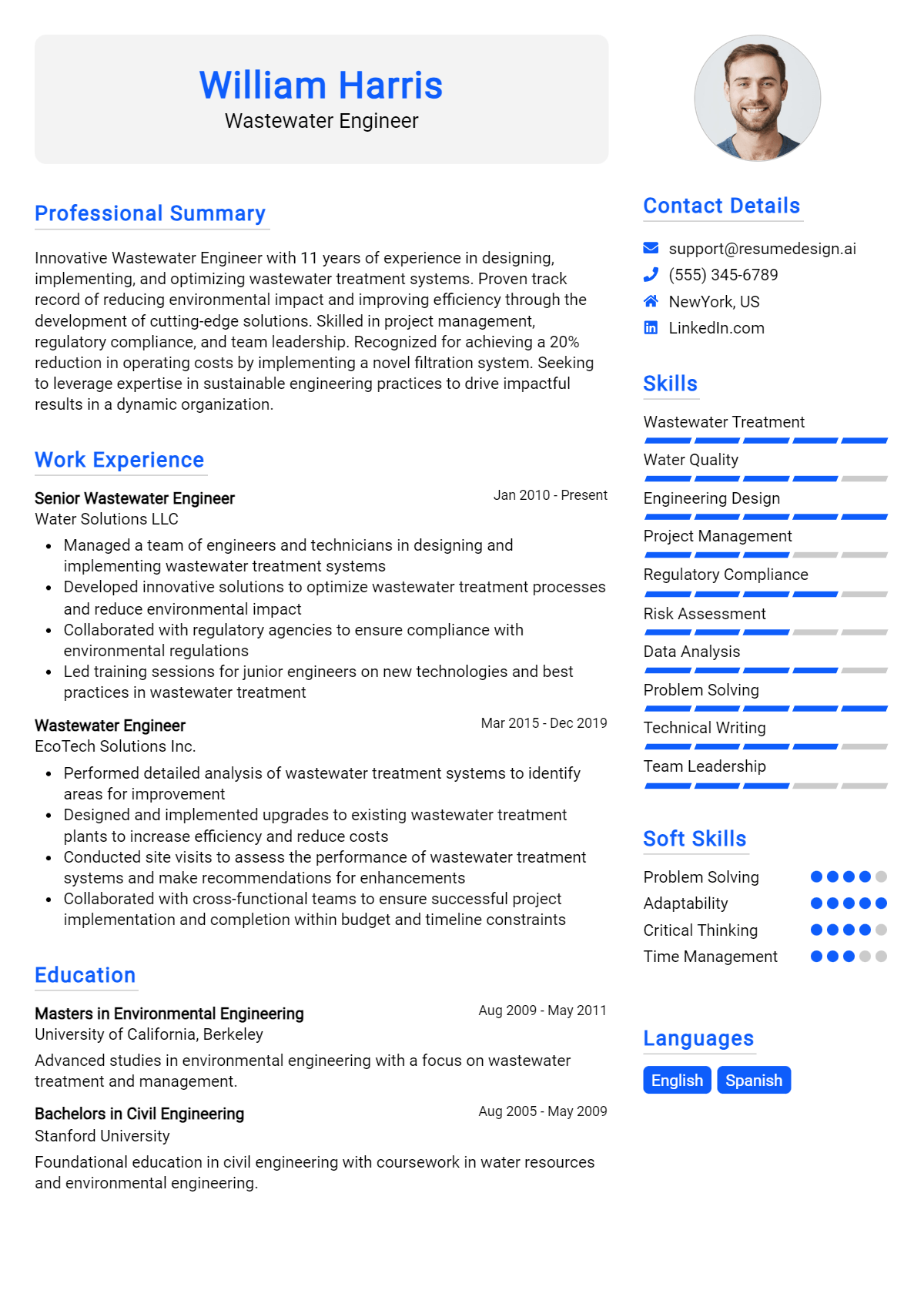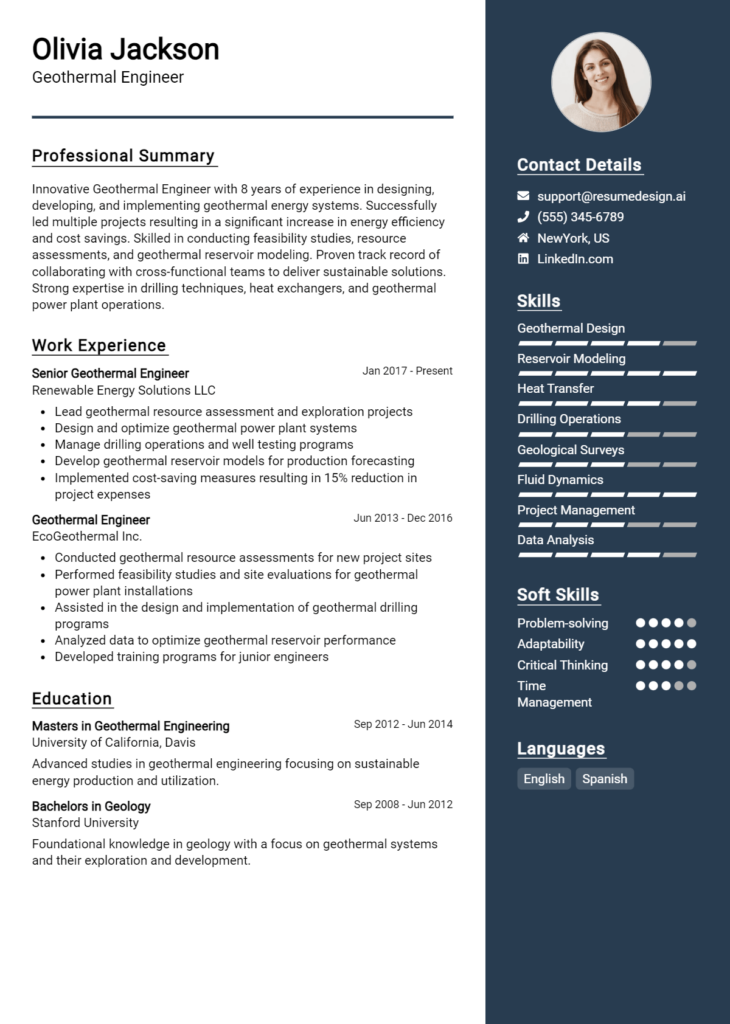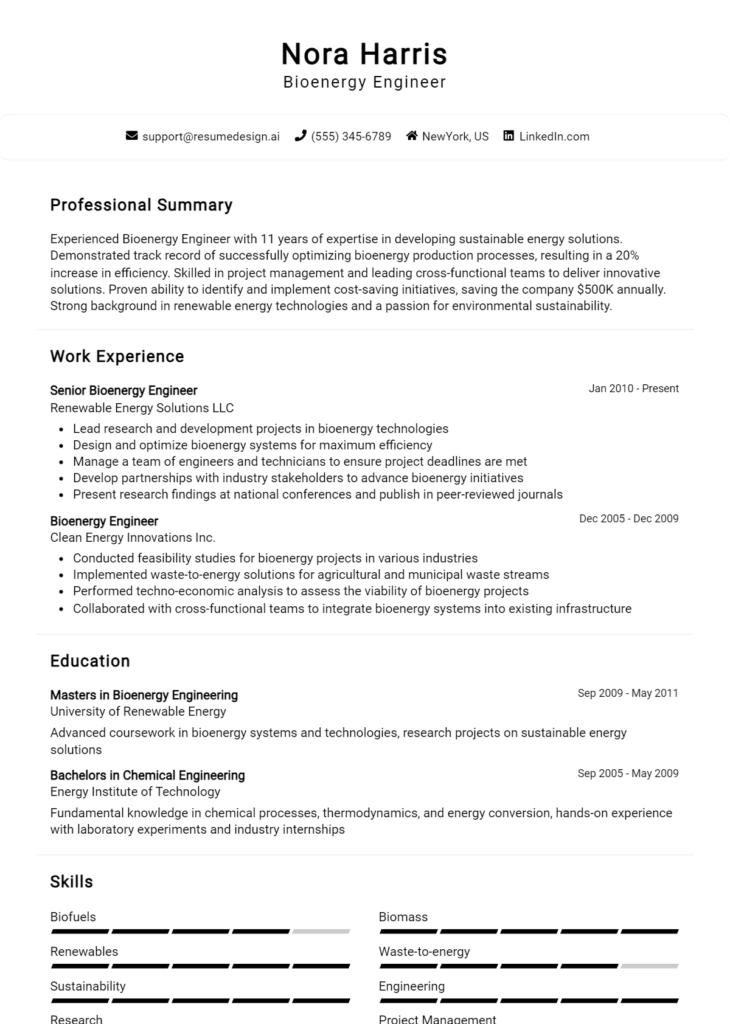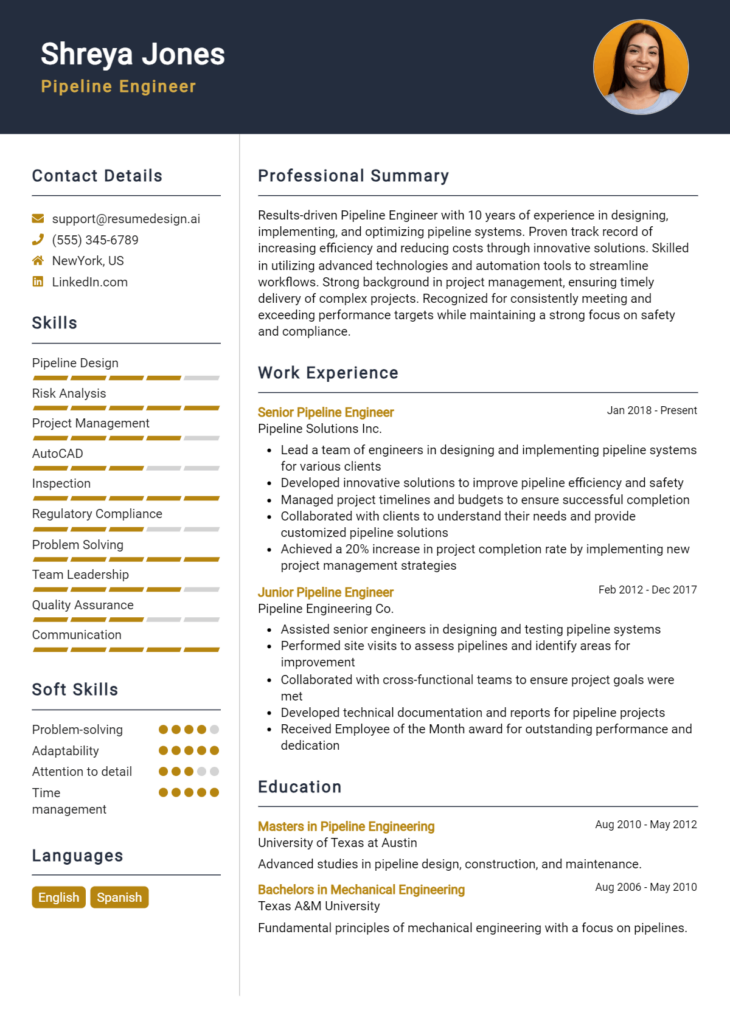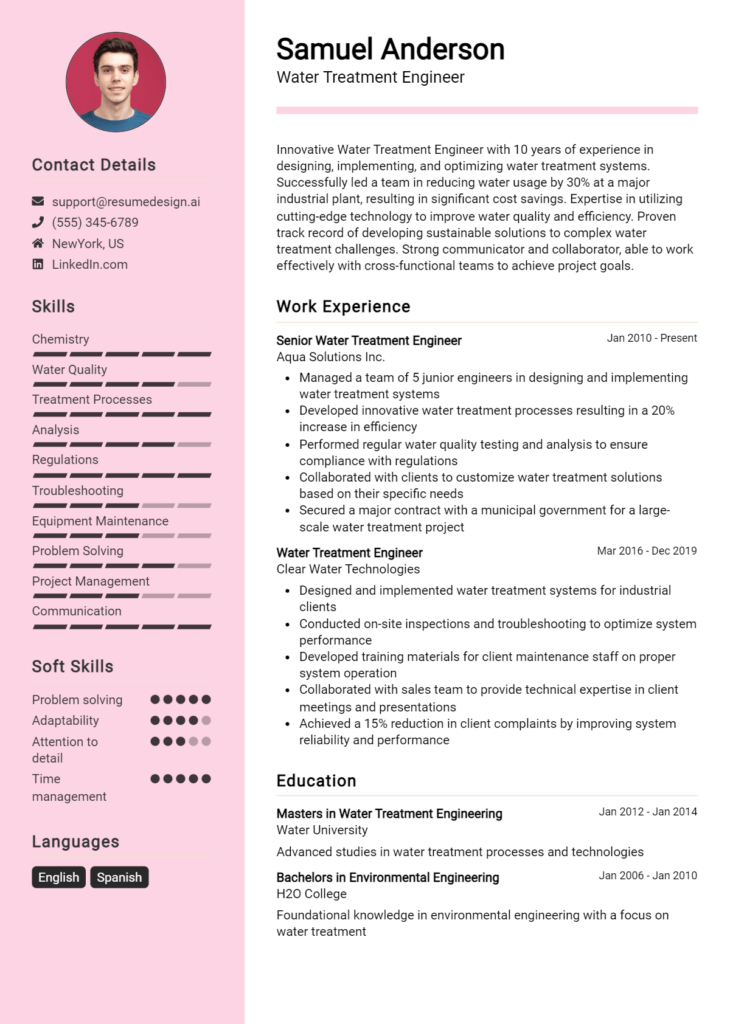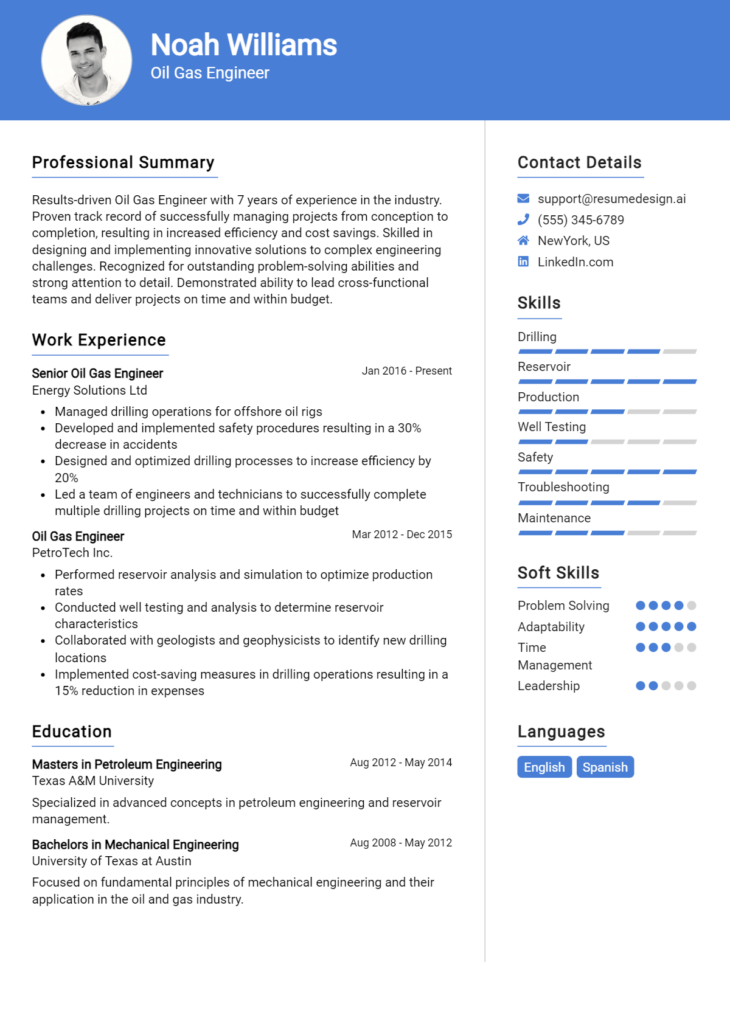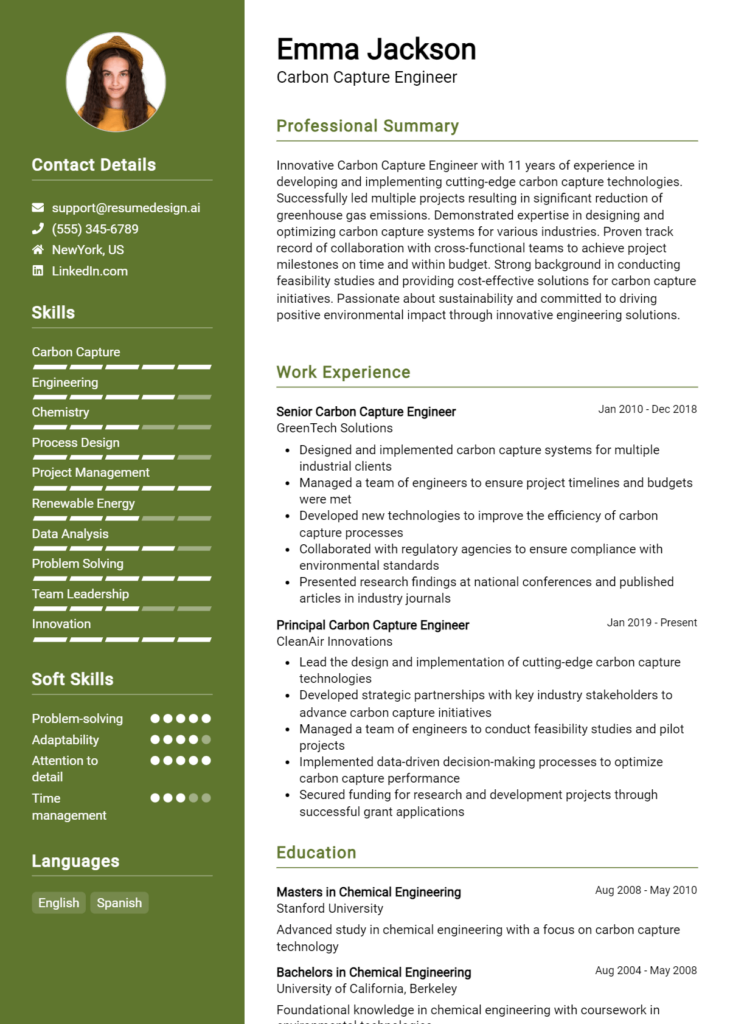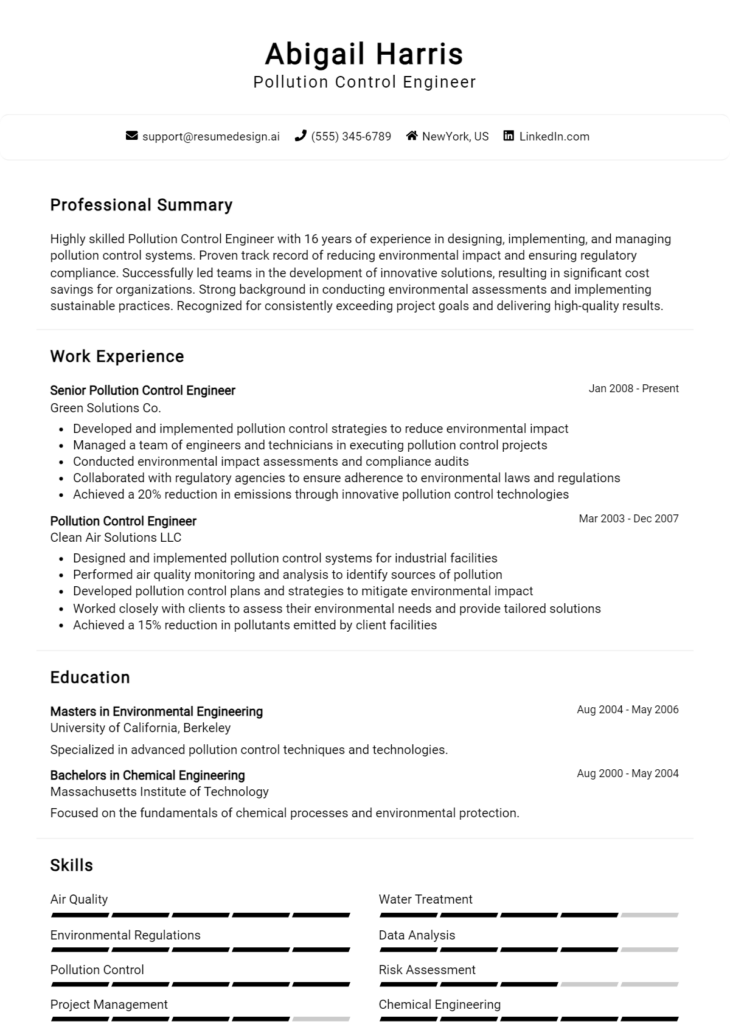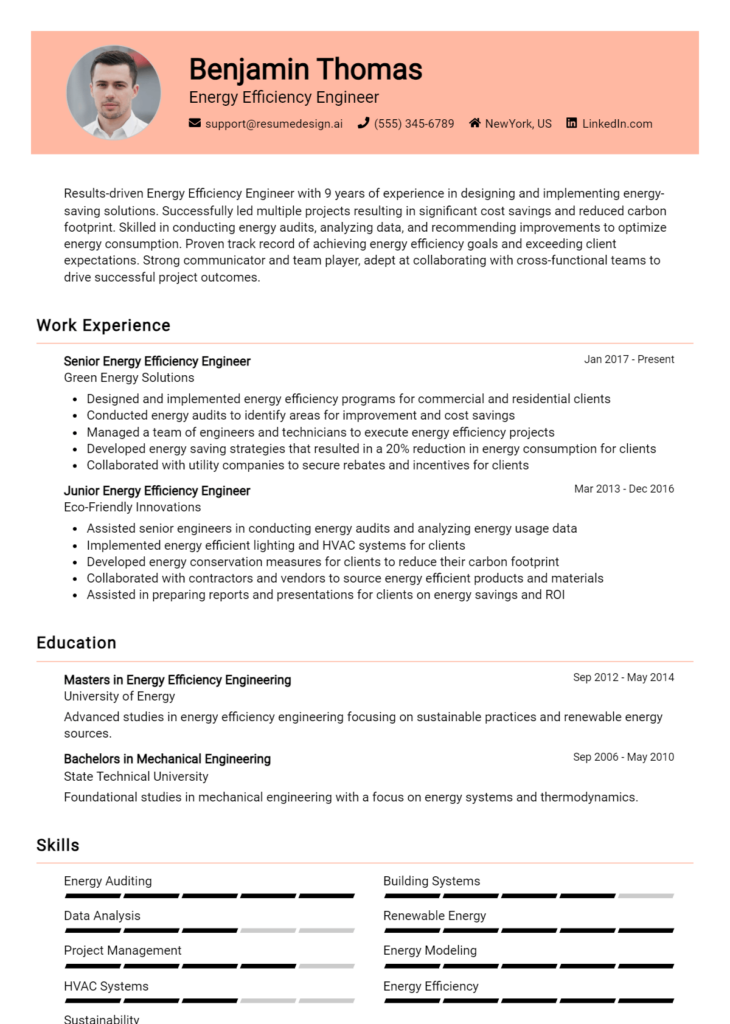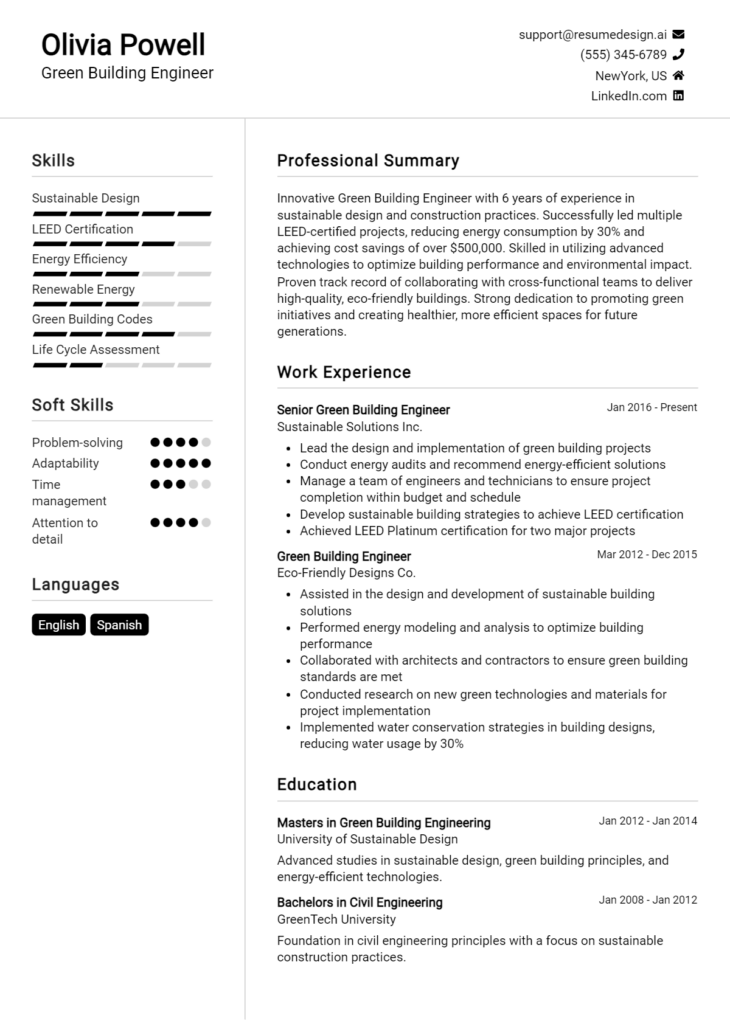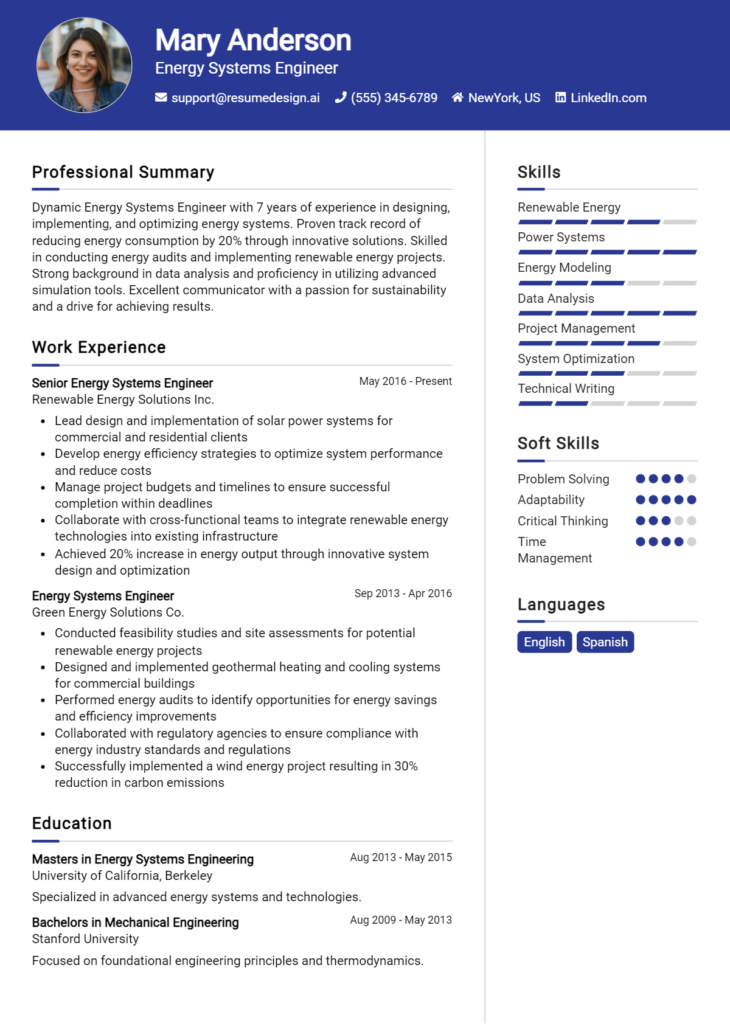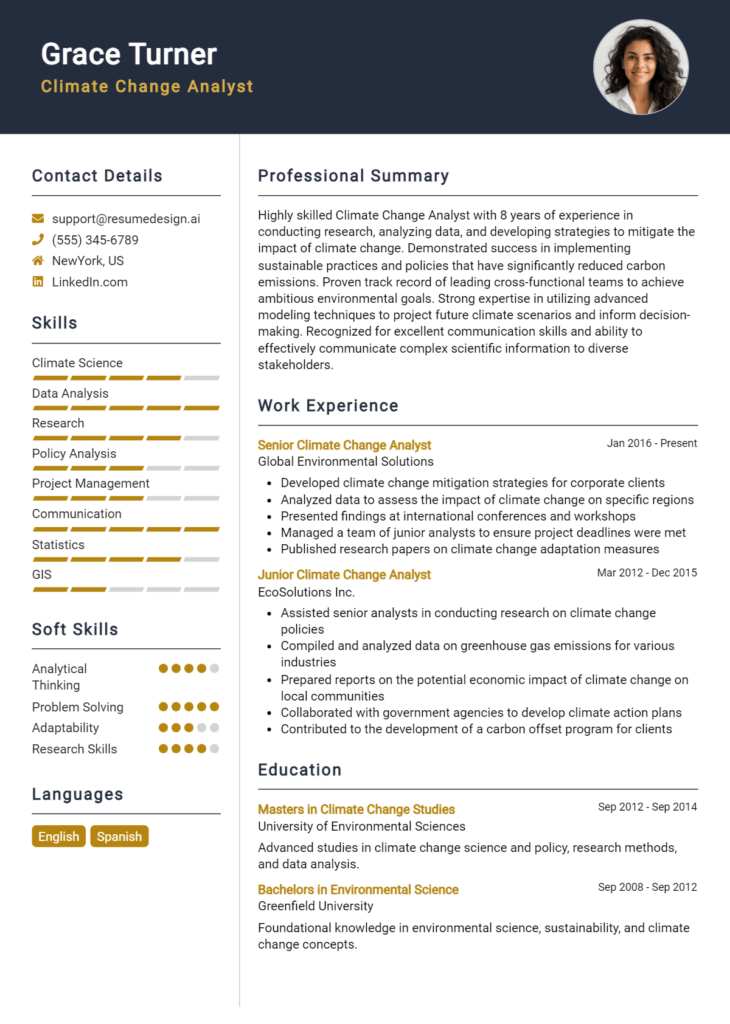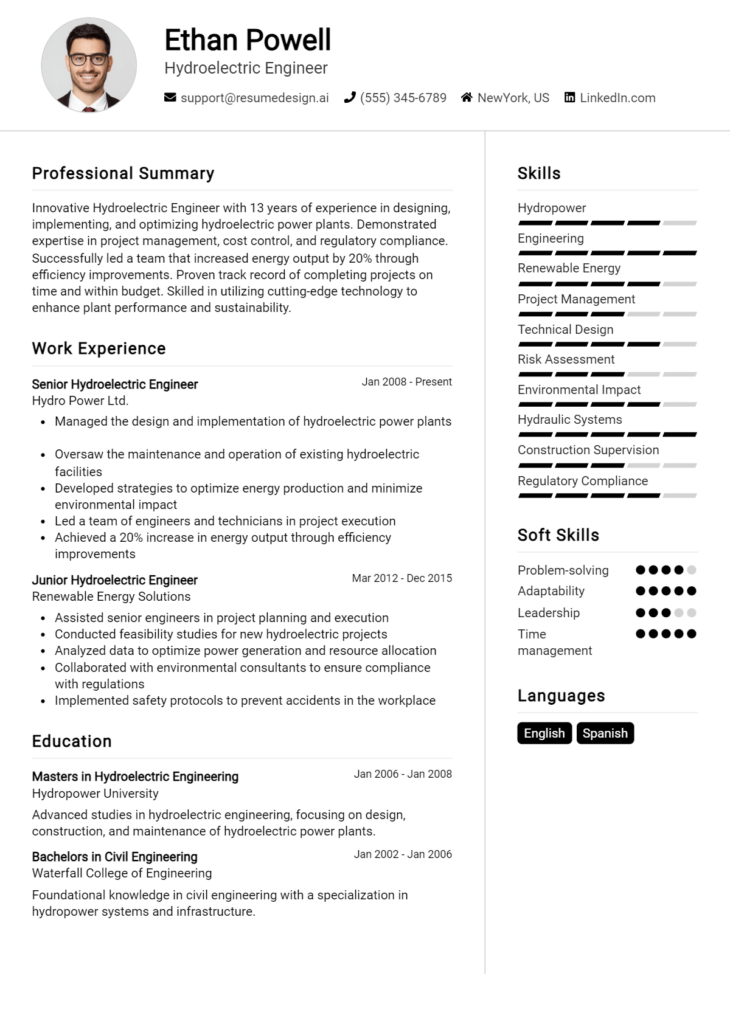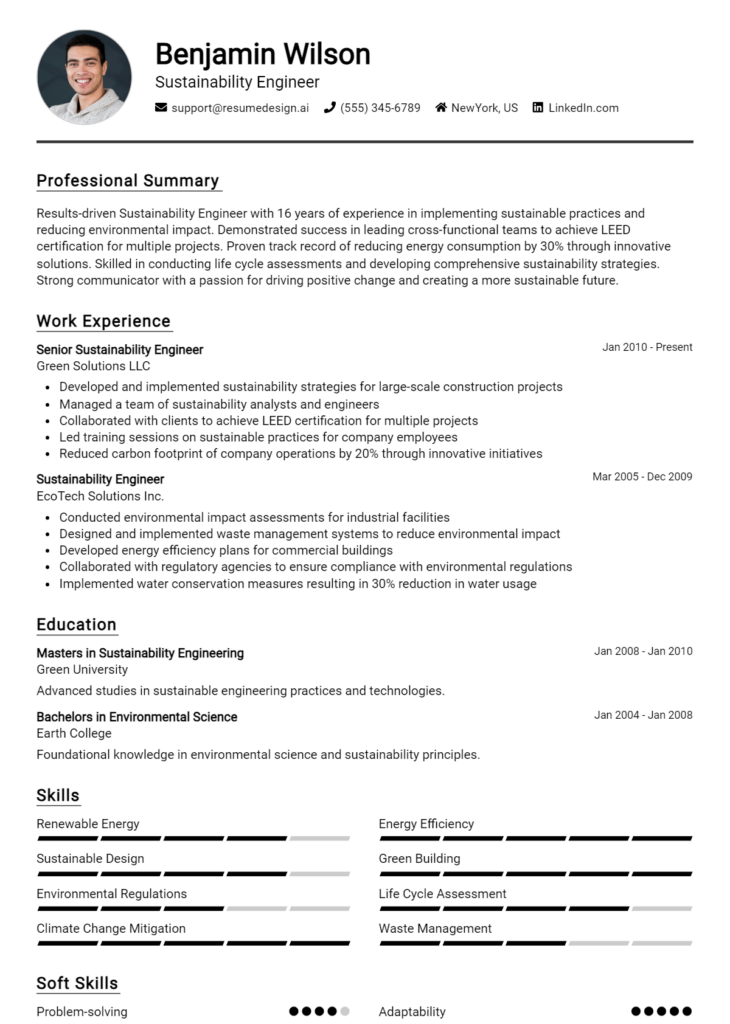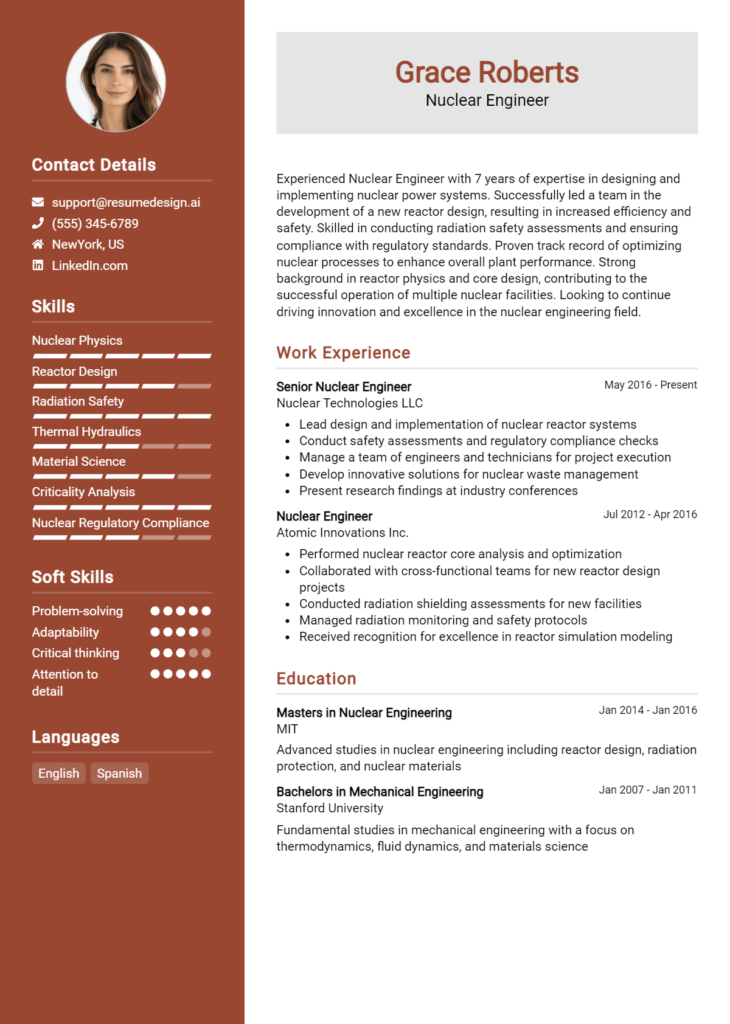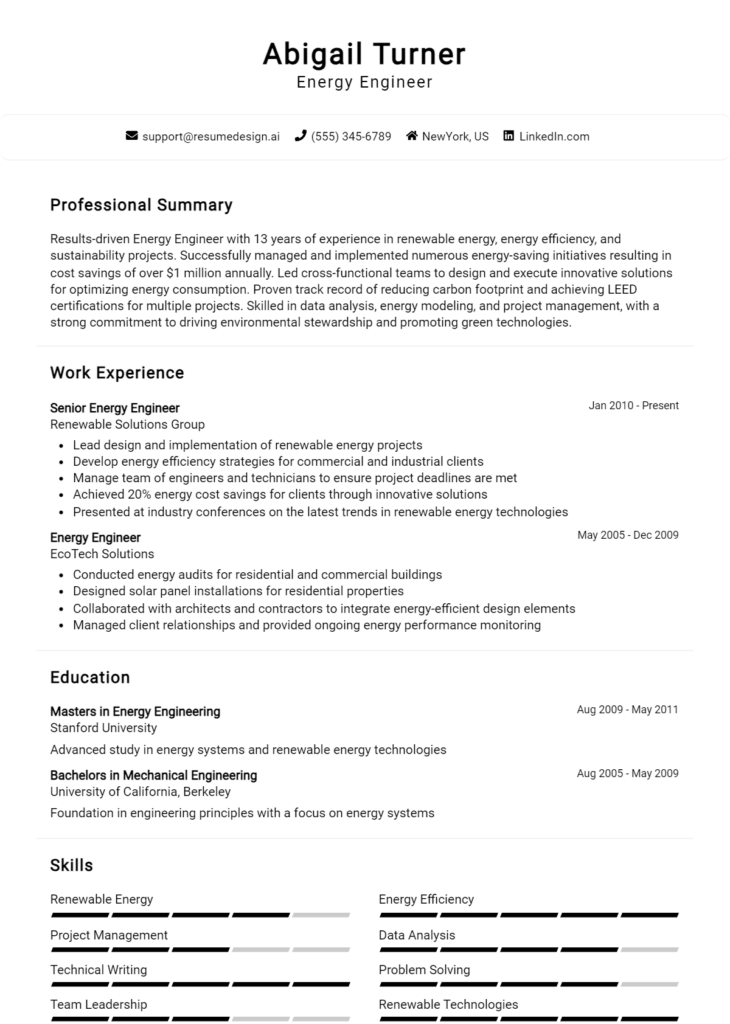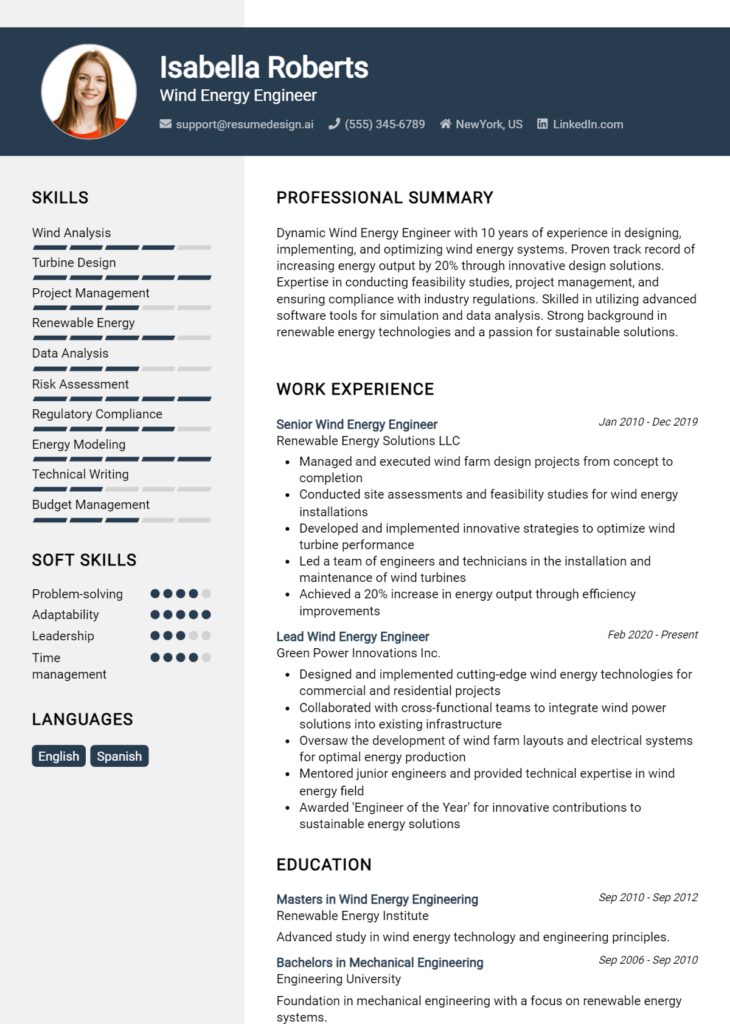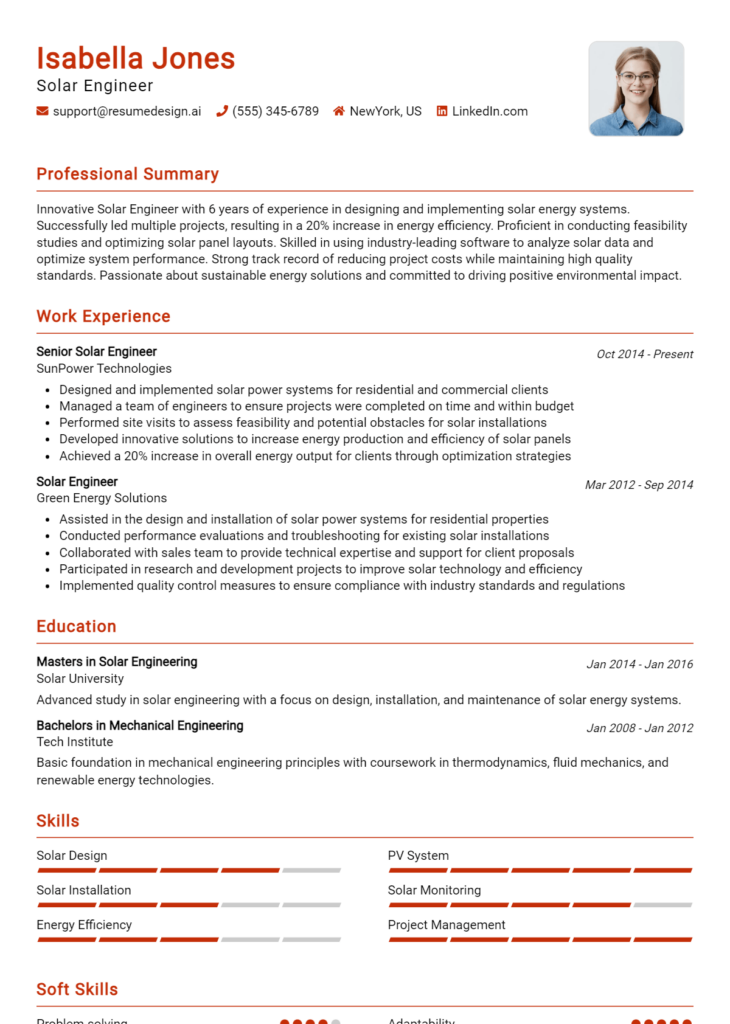Wastewater Engineer Core Responsibilities
A Wastewater Engineer plays a vital role in designing, operating, and maintaining wastewater treatment facilities. Key responsibilities include monitoring system performance, ensuring compliance with environmental regulations, and optimizing treatment processes. This role requires strong technical knowledge, operational insight, and problem-solving skills, facilitating collaboration across departments like environmental science and public health. Effective communication and analytical abilities are essential for achieving organizational goals. A well-structured resume can highlight these qualifications, enhancing career prospects in this critical field.
Common Responsibilities Listed on Wastewater Engineer Resume
- Design and implement wastewater treatment systems.
- Conduct feasibility studies and environmental impact assessments.
- Monitor and analyze water quality and treatment efficiency.
- Ensure compliance with local, state, and federal regulations.
- Develop and manage project budgets and timelines.
- Collaborate with multidisciplinary teams on engineering projects.
- Perform troubleshooting and maintenance of treatment equipment.
- Prepare technical reports and documentation.
- Train staff on operational procedures and safety protocols.
- Stay updated on industry trends and technological advancements.
- Implement sustainable practices within wastewater management.
High-Level Resume Tips for Wastewater Engineer Professionals
In the competitive field of wastewater engineering, a well-crafted resume is not just a document; it is your first introduction to potential employers. This crucial piece of professional representation should effectively showcase your skills, qualifications, and achievements, capturing the attention of hiring managers who are sifting through numerous applications. A thoughtfully designed resume can set you apart, demonstrating not only your technical expertise but also your commitment to the industry. This guide offers practical and actionable resume tips specifically tailored for wastewater engineer professionals, ensuring you present the best version of yourself on paper.
Top Resume Tips for Wastewater Engineer Professionals
- Tailor your resume to each job application by aligning your skills and experiences with the specific requirements outlined in the job description.
- Highlight relevant experience in wastewater treatment, including specific projects you've worked on and your role in their success.
- Quantify your achievements whenever possible, using metrics such as the percentage of efficiency improvement or the volume of wastewater treated.
- Emphasize industry-specific skills, such as knowledge of regulatory compliance, environmental regulations, and advanced treatment technologies.
- Include any relevant certifications or licenses, such as Professional Engineer (PE) status or certifications in wastewater treatment operations.
- Utilize keywords from the job description throughout your resume to pass through Applicant Tracking Systems (ATS) and catch the eye of hiring managers.
- Showcase your problem-solving abilities by detailing how you’ve tackled challenges in past projects and the outcomes achieved.
- Keep your resume concise and focused, ideally one page, while ensuring all important information is clearly presented.
- Incorporate a professional summary or objective statement that succinctly outlines your career goals and what you bring to the table.
By implementing these resume tips, you can significantly enhance your chances of landing a job in the wastewater engineering field. A polished, targeted resume will not only highlight your qualifications but also demonstrate your genuine interest and suitability for the role, making you a standout candidate in a competitive job market.
Why Resume Headlines & Titles are Important for Wastewater Engineer
In the competitive field of wastewater engineering, having a well-crafted resume is essential for standing out among other candidates. Resume headlines and titles play a crucial role in this process, serving as the first impression hiring managers have of a candidate's qualifications. A strong headline can immediately grab attention and succinctly summarize a candidate's key strengths, making it easier for hiring managers to assess their fit for the position. It should be concise, relevant, and directly related to the job being applied for, ensuring that it resonates with the specific requirements and expectations of the wastewater engineering sector.
Best Practices for Crafting Resume Headlines for Wastewater Engineer
- Keep it concise, ideally under 10 words.
- Focus on specific skills or areas of expertise related to wastewater engineering.
- Use action-oriented language to convey a sense of proactivity.
- Incorporate relevant certifications or qualifications to add credibility.
- Tailor the headline to match the job description closely.
- Highlight key accomplishments or years of experience in the field.
- Avoid jargon or overly technical terms that may not resonate with all hiring managers.
- Make sure it captures your unique value proposition as a wastewater engineer.
Example Resume Headlines for Wastewater Engineer
Strong Resume Headlines
Experienced Wastewater Engineer with 10+ Years in Treatment Plant Design
Certified Wastewater Treatment Operator Specializing in Process Optimization
Innovative Solutions Developer for Sustainable Water Management Systems
Results-Driven Wastewater Engineer Focused on Regulatory Compliance and Efficiency
Weak Resume Headlines
Engineer Looking for Opportunities
Wastewater Professional with Some Experience
The strong headlines listed above are effective because they are specific, convey a clear sense of the candidate's experience and skills, and demonstrate their value in the wastewater engineering field. They highlight particular strengths and qualifications that are relevant to the role, ensuring that hiring managers can quickly grasp the candidate's potential contributions. In contrast, the weak headlines fail to impress because they are vague and lack specificity, making it difficult for employers to understand what the candidate brings to the table. This lack of clarity can lead to missed opportunities, as they do not differentiate the candidate in a crowded job market.
Writing an Exceptional Wastewater Engineer Resume Summary
A well-crafted resume summary is crucial for a Wastewater Engineer, as it serves as the first impression a hiring manager will have of the candidate. This brief yet powerful section encapsulates key skills, relevant experience, and significant accomplishments that align with the specific demands of the role. A strong summary not only captures attention but also provides a clear snapshot of the candidate's qualifications, making it easier for hiring managers to identify the most suitable candidates quickly. It should be concise, impactful, and tailored to the job description, ensuring that it resonates with the employer's needs.
Best Practices for Writing a Wastewater Engineer Resume Summary
- Quantify Achievements: Include specific metrics or outcomes to demonstrate your impact in previous roles.
- Focus on Relevant Skills: Highlight technical skills pertinent to wastewater engineering, such as knowledge of treatment processes or regulatory compliance.
- Tailor for the Job Description: Customize your summary to reflect the key qualifications and responsibilities outlined in the job posting.
- Use Action-Oriented Language: Start sentences with strong action verbs to convey confidence and initiative.
- Keep it Concise: Aim for 2-4 sentences that deliver maximum impact without unnecessary fluff.
- Showcase Problem-Solving Abilities: Emphasize your ability to address challenges and implement effective solutions in wastewater management.
- Demonstrate Industry Knowledge: Mention familiarity with the latest technologies or best practices in wastewater treatment.
- Highlight Certifications: If applicable, note relevant certifications or training that enhance your qualifications.
Example Wastewater Engineer Resume Summaries
Strong Resume Summaries
Results-driven Wastewater Engineer with over 8 years of experience in managing treatment facilities, leading projects that improved efficiency by 25% and reduced operational costs by 15%. Proven expertise in regulatory compliance and innovative treatment solutions.
Detail-oriented Wastewater Engineer skilled in designing and optimizing wastewater treatment systems. Successfully implemented a new filtration technology that increased water recovery rates by 30%, enhancing overall plant performance.
Licensed Wastewater Engineer with a strong background in environmental engineering and a track record of successful project management. Led a team that achieved a 40% reduction in sludge volume through process optimization initiatives.
Weak Resume Summaries
Experienced engineer looking for a position in wastewater management. I have worked in various engineering roles and hope to contribute to your team.
Wastewater Engineer with many years in the industry. I possess skills that could be beneficial to your company.
The examples of strong resume summaries are considered effective because they utilize quantifiable results, specific skills, and relevant experiences that directly pertain to wastewater engineering. They clearly demonstrate the candidate's impact in previous roles, making it easy for hiring managers to see their potential value. In contrast, the weak summaries lack specificity and measurable outcomes, making them appear generic and less compelling. They do not effectively convey the candidate's qualifications or how they can contribute to the organization.
Work Experience Section for Wastewater Engineer Resume
The work experience section of a Wastewater Engineer resume is crucial as it provides prospective employers with a comprehensive view of the candidate's technical capabilities, leadership qualities, and effectiveness in delivering high-quality projects. This section not only highlights the candidate's hands-on experience in managing wastewater treatment processes and technologies but also showcases their ability to lead teams and collaborate with cross-functional stakeholders to achieve project goals. By quantifying achievements and aligning experiences with industry standards, candidates can effectively demonstrate their contribution to improving environmental sustainability and compliance within the wastewater sector.
Best Practices for Wastewater Engineer Work Experience
- Emphasize specific technical skills relevant to wastewater engineering, such as process optimization, regulatory compliance, and technology implementation.
- Quantify achievements with metrics, such as percentage reductions in pollution levels or cost savings from process improvements.
- Highlight leadership roles in projects, demonstrating your ability to manage teams and coordinate efforts among various stakeholders.
- Include specific project names and technologies used to provide context and credibility to your experiences.
- Tailor your work experience to align with job descriptions, using relevant keywords that reflect industry standards.
- Showcase collaboration through examples of cross-departmental projects or partnerships with external organizations.
- Focus on results-driven statements that clearly articulate your contributions and the impact of your work.
- Maintain a clear and concise format that makes your accomplishments easy to read and understand.
Example Work Experiences for Wastewater Engineer
Strong Experiences
- Led a team of engineers to design and implement a new wastewater treatment system, resulting in a 30% increase in efficiency and a 25% reduction in energy consumption.
- Managed a $2 million project to upgrade treatment facilities, ensuring compliance with state regulations and achieving a 15% reduction in operational costs.
- Collaborated with environmental scientists and regulatory agencies to develop an innovative biosolids management plan that improved community acceptance and reduced landfill contributions by 40%.
Weak Experiences
- Worked on various wastewater projects without specific details or outcomes.
- Assisted in team meetings related to wastewater engineering tasks.
- Involved in some technical work for wastewater treatment plants.
The examples of strong experiences are considered effective because they provide specific, quantifiable outcomes that demonstrate the candidate's technical expertise and leadership capabilities. They clearly illustrate how the candidate contributed to significant improvements in efficiency, cost savings, and regulatory compliance. In contrast, the weak experiences lack detail and measurable results, making it difficult for potential employers to gauge the candidate's impact or relevance to the position. Providing specific examples and metrics is essential for making a compelling case in the competitive field of wastewater engineering.
Education and Certifications Section for Wastewater Engineer Resume
The education and certifications section of a Wastewater Engineer resume is crucial as it serves as a testament to the candidate's academic background and commitment to the field. This section not only highlights relevant degrees and industry-recognized certifications but also showcases continuous learning efforts that are essential in a rapidly evolving industry. By providing details on relevant coursework, specialized training, and certifications, candidates can significantly enhance their credibility and demonstrate their alignment with the specific requirements of the job role.
Best Practices for Wastewater Engineer Education and Certifications
- Include degrees from accredited institutions that are relevant to engineering, environmental science, or wastewater management.
- List industry-recognized certifications such as Certified Wastewater Treatment Plant Operator (CWTPO) or Professional Engineer (PE) license.
- Highlight relevant coursework that pertains to wastewater treatment, hydrology, or environmental engineering.
- Emphasize any specialized training or workshops that align with advancements in wastewater technology.
- Use clear and concise formatting to ensure easy readability and quick reference for hiring managers.
- Keep the section updated with any ongoing education or new certifications to reflect commitment to professional growth.
- Tailor the content to match the specific job description, emphasizing the most relevant qualifications.
- Consider including participation in professional organizations related to wastewater management to enhance credibility.
Example Education and Certifications for Wastewater Engineer
Strong Examples
- Bachelor of Science in Environmental Engineering, University of XYZ, 2021
- Certified Wastewater Treatment Plant Operator (CWTPO), 2022
- Master of Science in Civil and Environmental Engineering, University of ABC, 2023
- Coursework in Advanced Wastewater Treatment Technologies, 2020
Weak Examples
- Bachelor of Arts in History, University of DEF, 2015
- Certification in Basic Plumbing, 2010
- Online Course in Gardening Techniques, 2021
- High School Diploma, 2010
The examples of strong educational qualifications and certifications are considered effective because they are directly relevant to the role of a Wastewater Engineer, showcasing a solid foundation in the necessary technical knowledge and skills. In contrast, the weak examples reflect qualifications that lack direct applicability to the field, demonstrating how candidates may not be adequately prepared for the specific challenges and responsibilities of a wastewater engineering position. This distinction emphasizes the importance of aligning educational credentials with career aspirations in the environmental engineering sector.
Top Skills & Keywords for Wastewater Engineer Resume
As a Wastewater Engineer, showcasing the right blend of skills on your resume is crucial for standing out in a competitive job market. Employers seek candidates who not only possess technical expertise but also demonstrate strong interpersonal abilities. A well-crafted resume that highlights your top skills can effectively communicate your qualifications and readiness to tackle the complexities of wastewater management. By incorporating both hard and soft skills, you can present yourself as a well-rounded professional, capable of contributing to sustainable water solutions.
Top Hard & Soft Skills for Wastewater Engineer
Soft Skills
- Problem-solving
- Communication
- Team collaboration
- Critical thinking
- Time management
- Project management
- Adaptability
- Attention to detail
- Leadership
- Conflict resolution
- Creativity
- Active listening
- Negotiation skills
- Customer service orientation
- Interpersonal skills
Hard Skills
- Knowledge of wastewater treatment processes
- Proficiency in AutoCAD and other design software
- Familiarity with environmental regulations
- Data analysis and interpretation
- Experience with hydraulic modeling
- Understanding of laboratory testing methods
- Project budgeting and cost estimation
- GIS mapping technologies
- Technical writing for reports and documentation
- Installation and maintenance of wastewater systems
- Risk assessment and management
- Knowledge of pump and motor operations
- Quality control and assurance practices
- Environmental impact assessments
- Regulatory compliance
- Wastewater system design
- Knowledge of SCADA systems
For more information on enhancing your resume with relevant skills and detailing your work experience, be sure to explore these resources.
Stand Out with a Winning Wastewater Engineer Cover Letter
As a dedicated and detail-oriented Wastewater Engineer with over five years of experience in managing and optimizing wastewater treatment processes, I am excited about the opportunity to contribute to your team at [Company Name]. My extensive background in both design and operational phases of wastewater systems, coupled with a solid foundation in environmental engineering principles, makes me a strong candidate for this role. I am particularly drawn to [Company Name] due to its commitment to sustainable practices and innovative solutions in water management.
In my previous role at [Previous Company Name], I successfully led a project aimed at enhancing the efficiency of our wastewater treatment facility. By implementing advanced technologies such as membrane bioreactors and real-time monitoring systems, we were able to reduce energy consumption by 20% and improve effluent quality significantly. My collaborative approach in working with cross-functional teams helped to foster an environment of innovation and safety, ensuring compliance with local and federal regulations while meeting project deadlines.
I am passionate about finding creative solutions to complex challenges in wastewater management. My proficiency in using software like AutoCAD and HEC-RAS allows me to design systems that not only meet regulatory standards but also support the community's needs. I believe my strong analytical skills and commitment to continuous improvement align well with the values at [Company Name]. I am eager to bring my expertise in hydraulic modeling, process optimization, and project management to your esteemed organization.
Thank you for considering my application. I look forward to the opportunity to discuss how my background, skills, and enthusiasms align with the goals of [Company Name]. I am excited about the possibility of contributing to innovative wastewater solutions that support environmental sustainability and community health.
Common Mistakes to Avoid in a Wastewater Engineer Resume
Crafting a compelling resume is crucial for a Wastewater Engineer, as it directly influences job prospects in this specialized field. However, many candidates make common mistakes that can hinder their chances of securing an interview. By avoiding these pitfalls, you can enhance your resume and better showcase your qualifications, experience, and skills to potential employers. Here are some common mistakes to steer clear of:
Neglecting Technical Skills: Failing to highlight relevant technical skills such as knowledge of wastewater treatment processes, design software, and regulatory compliance can make your resume less appealing. Ensure these skills are prominently featured.
Using Generic Templates: Relying on a one-size-fits-all template can make your resume blend in with others. Tailor your resume to reflect your specific experience and the requirements of the job you're applying for.
Overloading with Jargon: While technical terms are important, using excessive jargon can confuse hiring managers or recruiters who may not have a technical background. Strike a balance between technical language and clarity.
Listing Responsibilities Instead of Achievements: Simply listing job duties can come across as uninspired. Focus on quantifiable achievements and contributions that demonstrate your impact in previous roles.
Ignoring Industry Keywords: Many companies use Applicant Tracking Systems (ATS) to filter resumes. Failing to include relevant industry keywords can result in your resume being overlooked. Research the job description and incorporate those keywords.
Omitting Certifications and Licenses: As a Wastewater Engineer, specific certifications and licenses (like PE or wastewater treatment operator certification) are crucial. Ensure these qualifications are clearly stated.
Not Proofreading: Typos and grammatical errors can create an unprofessional impression. Always proofread your resume multiple times and consider having someone else review it for additional feedback.
Using an Unprofessional Email Address: An unprofessional email can detract from the seriousness of your application. Use a simple and professional email address, ideally your name or a variation of it.
Conclusion
As a Wastewater Engineer, you play a critical role in ensuring the effective treatment and management of wastewater, which is essential for public health and environmental protection. In this article, we discussed the various responsibilities of a Wastewater Engineer, including designing treatment systems, ensuring compliance with environmental regulations, and implementing innovative technologies to improve efficiency.
We also highlighted the importance of staying updated with industry trends and best practices, as well as the need for strong analytical and problem-solving skills in this field. The demand for skilled professionals in wastewater management continues to grow, emphasizing the importance of presenting a strong resume to secure your next opportunity.
To enhance your job prospects, now is the perfect time to review your Wastewater Engineer resume. Make sure it effectively showcases your skills, experiences, and achievements in the field. Utilize available resources such as resume templates, which can help you create a polished document, and the resume builder for a more tailored approach. Additionally, explore resume examples to gain inspiration and see what works well in your industry. Don’t forget to craft a compelling cover letter using our cover letter templates to accompany your resume.
Take action today! Optimize your resume and position yourself for success in the ever-evolving field of wastewater engineering.

